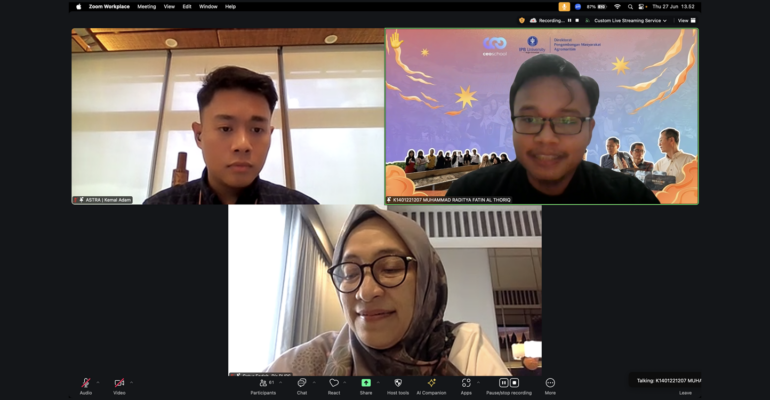Participants of the CEO School at IPB University Attend a Workshop on the Role of Social Forestry in Sociopreneurship Development

The Directorate of Agromaritime Community Development (DPMA) at IPB University held an Online Workshop as part of the CEO School 2024 program. This workshop focused on the important topic of ‘The Role of Social Forestry in Sociopreneurship Development’.
The event featured two speakers, namely Catur Endah Prasetiani P, SSi, MT, Director of Social Forestry Business Development at the Ministry of Environment and Forestry of the Republic of Indonesia (KLHK RI), and Muharam Kemal Adam, Sustainability Project Manager at PT Astra International Tbk.
In his presentation, Catur explained that social forestry is a forest management system carried out by local communities to improve their well-being and preserve the forests. This system allows communities to sustainably utilize the forests while maintaining their ecological functions
Furthermore, he also emphasizes the importance of social forestry in promoting sociopreneurship. “Social forestry not only provides environmental benefits but also opens up economic opportunities for communities around the forest,” he said.
According to him, with proper management, forests can become sustainable and highly beneficial resources. Catur outlines that the strategy for developing social forestry management plans should involve active participation from local communities. This strategy includes identifying the potential of the forest, assessing the needs of the community, and developing sustainable empowerment programs.
“A good management plan should encompass balanced economic, social, and environmental aspects,” he added.
He also emphasizes the importance of establishing social forestry bussiness groups, consisting of community members who share the same vision and mission in managing the forest. They are trained and provided with assistance to be able to run forest-based businesses professionally and sustainably.
Muharam Kemal Adam also shared his experience in managing sustainability projects at Astra International. “We at Astra International believe that sustainability is the key to the future. Through our projects, we strive to integrate social and environmental aspects into every business initiative,” he expressed.
He cited one successful social forestry project. “In one of our social forestry projects, the local community is actively involved in forest management, which not only improves their welfare but also ensures the sustainability of the forest,” he explained.
As for the mechanism of business permits in social forestry, it involves several stages, starting from submitting a proposal, field verification, to the issuance of permits by the relevant agency. “This process aims to ensure that the business activities carried out are in line with the principles of sustainability and do not damage the forest ecosystem,” he explained.
This workshop is expected to provide new insights for students, participants of the CEO School, about the importance of social forestry and their active role in supporting environmental sustainability through sociopreneurship activities. (*/Rz) (IAAS/EXC)



